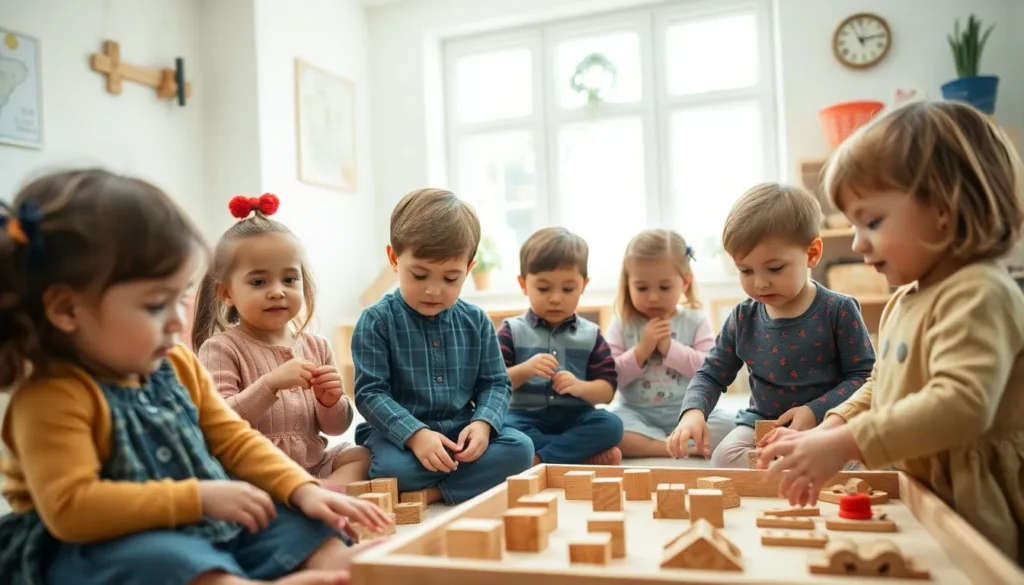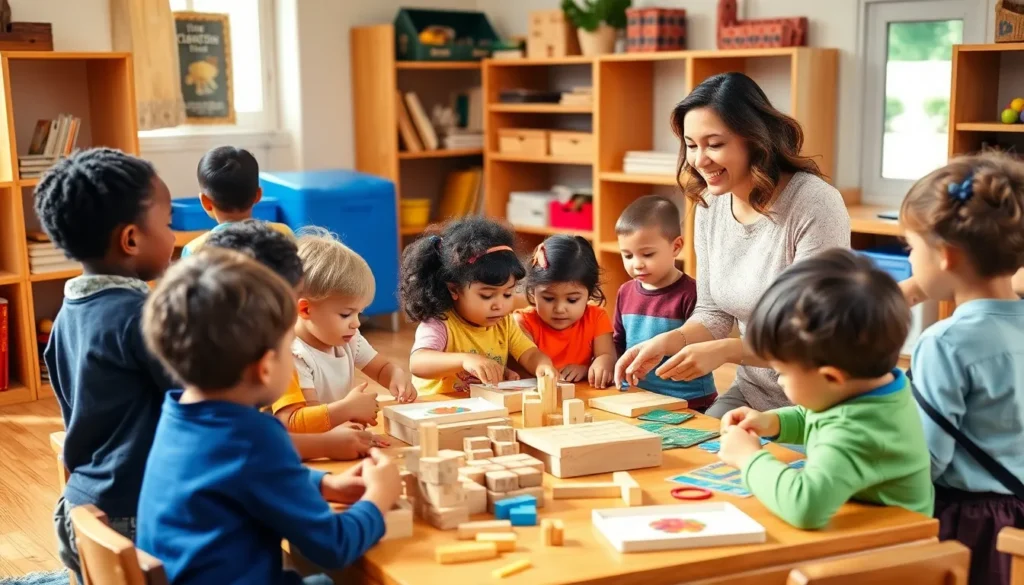Table of Contents
ToggleIn a world where traditional education often feels like a game of “sit down and be quiet,” the Montessori method bursts onto the scene like a confetti cannon at a library. This innovative approach to learning encourages kids to explore their interests and develop independence, all while having a blast. Imagine children diving into hands-on activities that spark their curiosity instead of memorizing facts for a test.
The Montessori method isn’t just another educational fad; it’s a philosophy that transforms how kids learn and grow. By creating an environment that nurtures creativity and critical thinking, it equips young minds with the skills they need for the future. So, if you’re ready to discover an approach that makes learning feel less like a chore and more like an adventure, buckle up! The journey into the Montessori world is about to get exciting.
Overview Of The Montessori Method
The Montessori method emphasizes child-centered learning, promoting independence and creativity. Children engage with specially designed materials that foster exploration and problem-solving skills. This approach respects each child’s natural development and unique learning pace.
In a Montessori classroom, mixed-age groups encourage collaboration and peer learning. Teachers act as guides, facilitating rather than directing the learning process. By allowing students to choose activities, they cultivate intrinsic motivation and a lifelong love for learning.
Montessori materials are specifically crafted to enhance sensory experiences and cognitive skills. Tools like matching cards, building blocks, and practical life activities support hands-on learning. Each material focuses on specific educational objectives, reinforcing concepts through practical application.
Assessment in Montessori education differs from traditional methods. It often includes observations and individual progress tracking instead of standardized tests. This encourages a more holistic view of a child’s development, capturing social, emotional, and academic growth.
Parent involvement also plays a vital role in the Montessori method. Collaborating with educators helps parents support their child’s learning journey at home. Workshops and community events foster dialogue between families and schools, creating a supportive network for children’s education.
The Montessori philosophy not only focuses on academic development but also on social skills and emotional well-being. It prepares children for future challenges by encouraging resilience, empathy, and critical thinking. This comprehensive approach equips students with essential life skills necessary for success.
Key Principles Of The Montessori Method

The Montessori method emphasizes several key principles that foster an enriched learning environment. This approach prioritizes children’s unique developmental paths, encouraging their natural curiosity.
Child-Centered Learning
Child-centered learning forms the core of the Montessori method. This principle acknowledges each child’s individual interests and learning styles. In such an environment, teachers support rather than direct learning experiences. Children explore subjects that inspire them, promoting deep engagement. Respect for their choices fosters independence, which builds confidence and critical thinking over time. The learning process remains personalized, allowing children to progress at their own pace.
Hands-On Learning Materials
Hands-on learning materials are central to Montessori education. These carefully designed tools stimulate exploration and problem-solving skills. Each material engages children in active learning, allowing them to experiment and discover concepts firsthand. With tactile resources, children reinforce their understanding while applying knowledge to real-world scenarios. Such interaction not only deepens learning but also encourages concentration and persistence. Effective use of these materials cultivates a love for learning, making education an enjoyable experience.
Benefits Of The Montessori Method
The Montessori method offers numerous advantages for children’s growth and development. A focus on self-directed learning fosters independence and creativity in every learner.
Development Of Independence
Children thrive in an environment where they make choices regarding their learning. This method encourages self-reliance, as students select activities that align with their interests. They gain confidence by handling tasks and problem-solving independently. Learning through exploration allows children to understand their capabilities better. Flexible classroom settings empower learners to engage at their own pace. Results show an increase in motivation when children take charge of their educational journey. These experiences cultivate essential life skills and prepare children for future challenges.
Fostering Critical Thinking Skills
The Montessori method enhances critical thinking through hands-on learning experiences. Children engage with materials that challenge their problem-solving abilities. This approach encourages inquiry, allowing students to ask questions and seek solutions actively. Rather than simply memorizing facts, they analyze information and draw connections. Collaborative projects further promote discussion and idea-sharing among peers. These practices stimulate cognitive development and empower children to think creatively. Evidence suggests that students in Montessori settings exhibit stronger critical thinking skills, equipping them for success in complex situations.
Implementation In Modern Education
Montessori education integrates seamlessly into modern educational frameworks, reflecting a shift towards child-centered learning.
Montessori Schools Worldwide
Montessori schools operate globally, with thousands of institutions in over 110 countries. These schools serve various age groups, from infants to adolescents, using tailored curricula. Classroom environments emphasize mixed-age groups, allowing peer collaboration. Teachers guide students, supporting exploration and initiative. Research indicates that children in Montessori environments often show enhanced engagement and academic performance compared to traditional settings. Notably, schools often feature specially designed learning materials that promote hands-on discovery. The approach focuses on individual learning paths, fostering a deep, personal connection to knowledge.
Adapting Montessori Principles At Home
Parents can effectively adapt Montessori principles to create supportive learning environments at home. They can design spaces that encourage exploration and independence. Age-appropriate learning materials foster curiosity and creativity. Establishing routines that promote self-discipline helps children manage their time effectively. Engaging children in daily tasks allows them to practice responsibility while developing essential life skills. Observing children’s interests can guide activity selection, ensuring that learning remains enjoyable and relevant. Through collaboration and open communication, families reinforce the values of self-directed learning, further enhancing children’s growth and development.
The Montessori method stands out as a transformative approach to education that prioritizes the child’s natural development and interests. By fostering independence and creativity through hands-on learning, it equips children with vital skills for their future. This philosophy not only nurtures academic growth but also emphasizes social and emotional development, preparing children for real-world challenges.
As more families embrace Montessori principles at home and schools worldwide adopt this innovative framework, the impact on children’s learning experiences continues to grow. The journey into Montessori education offers an exciting opportunity for children to thrive in an environment that values exploration, collaboration, and personal growth.





